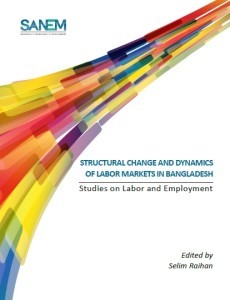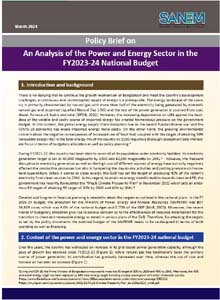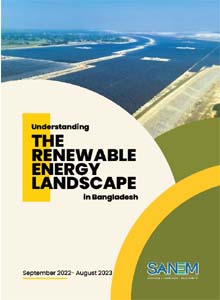
Structural Change and Dynamics of Labor Markets in Bangladesh: Studies on Labor and Employment
 Bangladesh’s achievement in economic growth over the last one decade has been quite robust. The country has recently been upgraded from low income country (LIC) to lower-middle income country (LMIC) as per World Bank’s classification. There is an aspiration of graduating from the LDC status to middle income country by 2021 as per the United Nations’ classification. The 7th five year plan sets the target of 8 percent GDP growth rate by 2020. This requires a huge leap forward from the current level of 6 percent average growth rate. The situation also demands for a considerable structural change in the economy leading to large scale economic diversification, promotion of labor-intensive and high-productivity sectors, both in farm and nonfarm sectors, and interventions to enhance productivity, jobs and incomes in traditional and informal activities where there are large pools of surplus labor. Against this backdrop, South Asian Network on Economic Modeling (SANEM) is happy to offer the volume titled Structural Change and Dynamics of Labor Markets in Bangladesh: Studies on Labor and Employment. This publication is a compilation of the papers produced under a research project titled “Changing Labor Markets in Bangladesh: Understanding Dynamics in Relation to Economic Growth and Poverty”, sponsored by the International Development Research Center (IDRC), Canada. This volume covers a wide range of issues related to labor markets in Bangladesh. These include structural change and employment creation, factors affecting the choice between farm and nonfarm employments, employment status and wellbeing of rural households, factors influencing female labor force participation, unpacking unpaid family labor, dynamics of employment in the urban informal sector, social protection programs impacting on labor force participation behavior, impact of both international and internal remittances on the domestic labor market, some estimates of the first demographic dividend in Bangladesh, role of education and skill development in the transition from ‘good-enough’ job to ‘decent’ job, issue of agricultural seasonality in skill training, and policy simulations using social accounting matrix and computable general equilibrium frameworks.
Bangladesh’s achievement in economic growth over the last one decade has been quite robust. The country has recently been upgraded from low income country (LIC) to lower-middle income country (LMIC) as per World Bank’s classification. There is an aspiration of graduating from the LDC status to middle income country by 2021 as per the United Nations’ classification. The 7th five year plan sets the target of 8 percent GDP growth rate by 2020. This requires a huge leap forward from the current level of 6 percent average growth rate. The situation also demands for a considerable structural change in the economy leading to large scale economic diversification, promotion of labor-intensive and high-productivity sectors, both in farm and nonfarm sectors, and interventions to enhance productivity, jobs and incomes in traditional and informal activities where there are large pools of surplus labor. Against this backdrop, South Asian Network on Economic Modeling (SANEM) is happy to offer the volume titled Structural Change and Dynamics of Labor Markets in Bangladesh: Studies on Labor and Employment. This publication is a compilation of the papers produced under a research project titled “Changing Labor Markets in Bangladesh: Understanding Dynamics in Relation to Economic Growth and Poverty”, sponsored by the International Development Research Center (IDRC), Canada. This volume covers a wide range of issues related to labor markets in Bangladesh. These include structural change and employment creation, factors affecting the choice between farm and nonfarm employments, employment status and wellbeing of rural households, factors influencing female labor force participation, unpacking unpaid family labor, dynamics of employment in the urban informal sector, social protection programs impacting on labor force participation behavior, impact of both international and internal remittances on the domestic labor market, some estimates of the first demographic dividend in Bangladesh, role of education and skill development in the transition from ‘good-enough’ job to ‘decent’ job, issue of agricultural seasonality in skill training, and policy simulations using social accounting matrix and computable general equilibrium frameworks.



